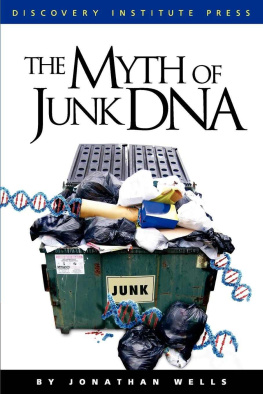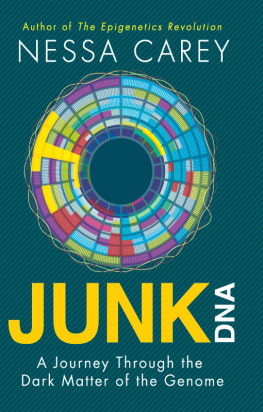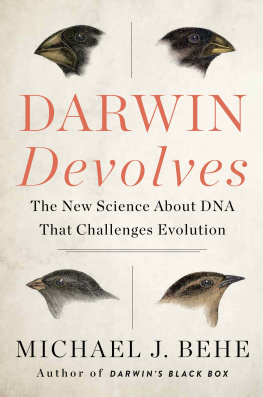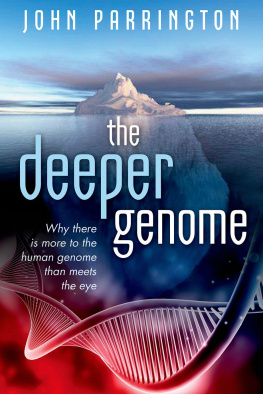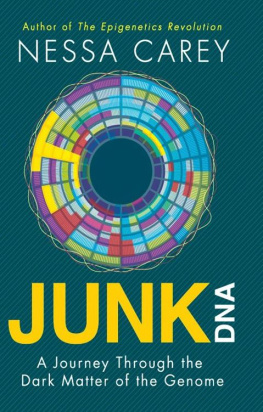
Description
According to a number of leading proponents of Darwins theory, junk DNAthe non-protein coding portion of DNAprovides decisive evidence for Darwinian evolution and against intelligent design, since an intelligent designer would presumably not have filled our genome with so much garbage. But in this provocative book, biologist Jonathan Wells exposes the claim that most of the genome is little more than junk as an anti-scientific myth that ignores the evidence, impedes research, and is based more on theological speculation than good science.
Copyright Notice
Text copyright 2011 by Jonathan Wells. All Rights Reserved.
Illustrations copyright 2010 by Ray Braun Design. All Rights Reserved.
Publishers Note
This book is part of a series published by the Center for Science & Culture at Discovery Institute in Seattle. Previous books include The Deniable Darwin by David Berlinski, In the Beginning and Other Essays on Intelligent Design by Granville Sewell, God and Evolution: Protestants, Catholics, and Jews Explore Darwins Challenge to Faith, edited by Jay Richards, and Darwins Conservatives: The Misguided Quest by John G. West.
Library Cataloging Data
The Myth of Junk DNA by Jonathan Wells (1942)
Illustrations by Ray Braun
174 pages, 6 x 9 x 0.4 inches & 0.6 lb, 229 x 152 x 10 mm. & 0.26 kg
Library of Congress Control Number: 2011925471
BISAC: SCI029000 SCIENCE / Life Sciences / Genetics & Genomics
BISAC: SCI027000 SCIENCE / Life Sciences / Evolution
ISBN-13: 978-1-9365990-0-4 (paperback)
Publisher Information
Discovery Institute Press, 208 Columbia Street, Seattle, WA 98104 Internet: http://www.discoveryinstitutepress.com/
Published in the United States of America on acid-free paper.
First Edition, First Printing: May 2011.
Kindle Edition: January 2012.
Praise forThe Myth of Junk DNA
J ONATHAN W ELLS HAS CLEARLY DONE HIS HOMEWORK . I N T HE M YTH of Junk DNA, he cites hundreds of research articles as he describes the expanding story of non-coding DNAthe supposed junk DNA. It is quite possibly the most thorough review of the subject available. Dr. Wells makes it clear that our early understanding of DNA was incomplete, and genomics research is now revealing levels of control and complexity inside our cells that were undreamed of in the 1980s. Far from providing evidence for Darwinism, the story of non-coding DNA rather serves to increase our appreciation for the design of life.
Ralph Seelke, Ph.D.
Professor of Microbial Genetics and Cell Biology
University of Wisconsin-Superior
C ITING HUNDREDS OF PEER-REVIEWED ARTICLES WHICH SHOW THAT more and more of the genome is functional, Jonathan Wells delivers a powerful and carefully researched broadside against the junk DNA hypothesis. Even biologists who firmly reject the notion of intelligent design must surely acknowledge on the evidence presented in this timely book that appealing to junk DNA to defend the Darwinian framework no longer makes any sense.
Michael Denton, Ph.D.
Medical Geneticist and Author of Natures Destiny
T HIS IS AN EXCELLENT AND IN-DEPTH DISCUSSION OF SEVERAL KEY points of the subject of junk-DNA. The author shows for many prime examples still advanced by leading neo-Darwinians that the Darwin-of-the-gaps approach doesnt function or is at least doubtful.
Wolf-Ekkehard Lnnig, Ph.D.
Senior Scientist, Department of Molecular Plant Genetics
Max Planck Institute for Plant Breeding Research (retired)
T HERE IS A BOX IN THE BIOLOGICAL SCIENCES INTO WHICH ALL EVIDENCE must be placed. That box is called Darwinian evolution. In The Myth of Junk DNA Jonathan Wells tells the intriguing story of junk DNAthe idea that non-protein coding DNA, which accounts for the majority of the DNA in the genome, is non-functional and without purpose; the result of the unguided purposeless process of random mutation and natural selection that produced it. In recent years, however, numerous researchersnot necessarily opponents of Darwinian evolution or advocates of intelligent designhave discovered many functions for non-protein coding DNA, which are thoroughly reviewed by Wells in this book. Unfortunately, in their effort to keep the junk label attached to non-protein coding DNA so that it remains in the box of Darwinian evolution, a number of prominent Darwinists continue to insist, in spite of the recent results to the contrary, that it is largely left-over waste from the evolutionary process. As Wells clearly demonstrates in his book, this dogmatic commitment inhibits the scientific process. Science needs to be guided by objective evaluation of the evidence, and scientists should not allow their thinking to be arbitrarily restricted by dogmatic ideas. We need scientists who think outside the Darwinian box. Wellss book not only informs its readers of very recent research results, but also encourages them to think objectively and clearly about a key discovery in biology and to approach biological research with more creativity. It is a great read.
Russell W. Carlson, Ph.D.
Professor of Biochemistry and Molecular Biology
University of Georgia
F OR YEARS , D ARWINISTS HAVE CLAIMED THAT MOST DNA IS LEFT-OVER detritus from failed evolutionary experiments. This junk DNA has been offered as evidence for Darwinism and evidence against intelligent design. The only problem with the claim, as Jonathan Wells shows in this fascinating book, is that its not true. Careful scientists have known for some time that the non-coding regions of DNA have all manner of function, so it is surprising to see prominent Darwinian scientists and their spokesmen continue to push the party line. Now that the evidence against the junk DNA story is indisputable, its defenders will want to beat a hasty retreat. The Myth of Junk DNA will make it hard for them to cover their tracks.
Jay Richards, Ph.D.
Co-Author, The Privileged Planet, and Editor, God and Evolution
C ONTENTS
I LLUSTRATIONS
T HE DISCOVERY IN THE 1970S THAT ONLY A TINY PERCENTAGE OF our DNA codes for proteins prompted some prominent biologists at the time to suggest that most of our DNA is functionless junk. Although other biologists predicted that non-protein-coding DNA would turn out to be functional, the idea that most of our DNA is junk became the dominant view among biologists.
That view has turned out to be spectacularly wrong.
Since 1990and especially after completion of the Human Genome Project in 2003many hundreds of articles have appeared in the scientific literature documenting the various functions of non-protein-coding DNA, and more are being published every week.
Ironically, even after evidence for the functionality of non-protein-coding DNA began flooding into the scientific literature, some leading apologists for Darwinian evolution ratcheted up claims that junk DNA provides evidence for their theory and evidence against intelligent design. Since 2004, biologists Richard Dawkins, Douglas Futuyma, Kenneth Miller, Jerry Coyne and John Avise have published books using this argument. So have philosopher of science Philip Kitcher and historian of science Michael Shermer. So has Francis Collins, former head of the Human Genome Project and present director of the National Institutes of Health, despite the fact that he co-authored some of the scientific articles providing evidence against junk DNA.

